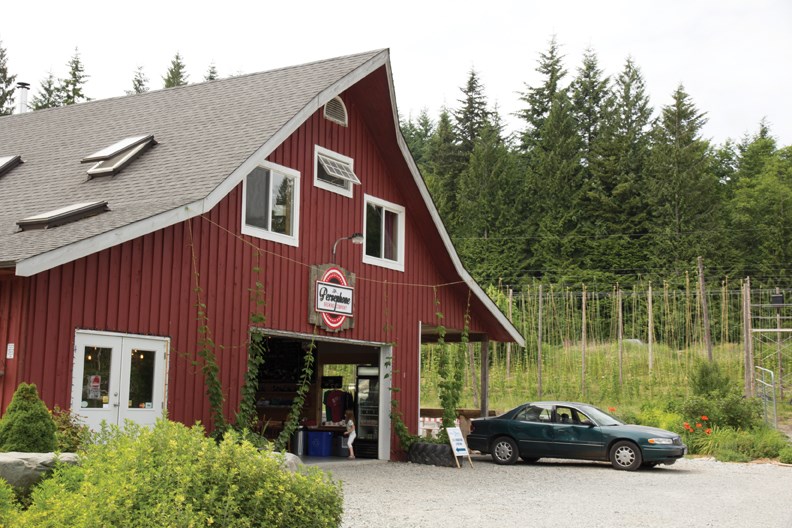The Sunshine Coast Regional District (SCRD) is prepared to support Persephone Brewing Company’s application for non-farm use in the Agricultural Land Reserve (ALR), but it’s also recommending the Agricultural Land Commission (ALC) impose specific restrictions.
The application was before the planning and development committee on June 16.
ALR rules allow breweries, wineries and cideries as a farm use if 50 per cent of the ingredients used are grown on the property. Persephone needs a non-farm use approval from the ALC because it can’t meet that requirement at its 1053 Stewart Rd. location.
Before drafting recommendations for the ALC, the SCRD held community workshops on the application March 19 and 21.
After telling the committee he was prepared to support the application and the planning department’s suggested restrictions, West Howe Sound Director Ian Winn thanked constituents for their patience during a long process and for their comments and input.
“The majority of people I have heard from support this business and its social enterprise model. However, there are many people who have raised concerns regarding ALR land use, conformance to current local and provincial regulations, and the business practices of this operation,” Winn said.
“The challenge for me, of course, is to find the balance point that respects and values all those opinions and concerns. There are also challenges and responsibilities for our local government and for the provincial government through the Agricultural Land Com-mission. And it’s clear the ALC must now step up and deliver on its responsibilities on these very critical next steps. This report and these recommendations to the ALC serve to underscore the importance our community places on policy, process and economic development.”
In a letter delivered to the committee just ahead of the meeting, Brian Smith of Persephone said, “We are largely impressed with this report and recommendations submitted. Together we have come a long way in the last year and it’s great to know that the SCRD is in support of Persephone’s farming and brewing operation.”
Smith went on to point out that Persephone has had no complaints since May 2015. “We have contained live music to inside areas only, implemented multiple measures to manage parking and traffic and generally made a sincere effort to work with our neighbours in a collaborative and mutually respectful way.”
The letter also asked that directors consider some changes to the recommendations put forward by SCRD planning staff.
Persephone wanted the original recommendation for a 100 sq. metre (1,076 sq. foot) indoor and 50 sq. metre (538 sq. foot) outdoor maximum floor space for the lounge and mobile food vendor area increased to 125 sq. metre indoors, and 125 sq. metre outdoors. They also asked for the seating capacity to be raised from 30 to 65 (both indoor and out).
“I have to wonder, what is the rationale for the recommendation of 100 sq. metres and 50 sq. metres? These areas have had zero legal problems such as liquor violations, violence or vandalism over the past three years,” the letter stated.
Smith also said the wording in the report on the community workshops gave the impression of an even split between people for and against that might give the ALC cause to doubt community support for the application. Smith claims it was closer to three or four to one in favour.
Although both directors Darnelda Siegers of Sechelt (who did not have a vote on the issue) and Roberts Creek’s Mark Lebbell backed the idea of striking the floor area and seating recommendations, the amendment was voted down.
Winn argued the recommendations should remain to “send a message.”
“The inclusion of these restrictions is a good step at this time, because the scale of operations that I would like to see in rural areas is smaller by nature,” he said. “This provides us with an opportunity to get just a little bit ahead of things and state that the size of operations for lounges and food vendors and things that would be supported by this board is smaller [rather than deal after the fact with an operation that has grown large].”
The SCRD is also asking the ALC to create guidelines and conditions for events that don’t really fall under agri-tourism.
The recommendations were due to go to the SCRD board meeting June 23 for final endorsement before being sent to the ALC. The commission will have the final say and could choose to impose different restrictions, but it has historically given weight to recommendations from local governments.



